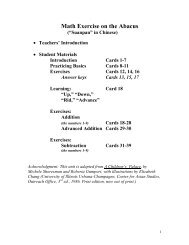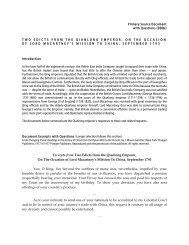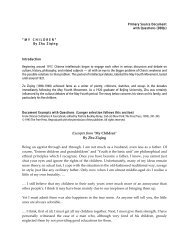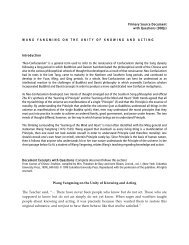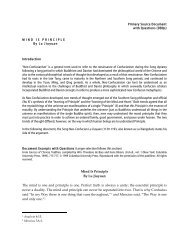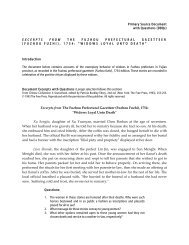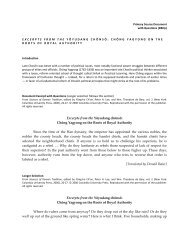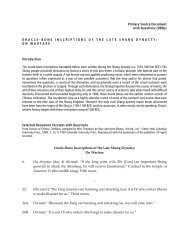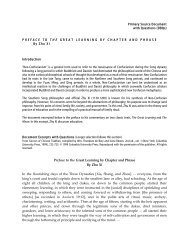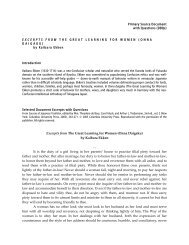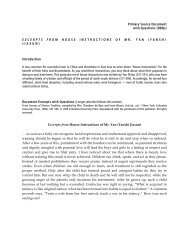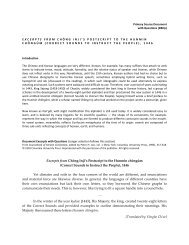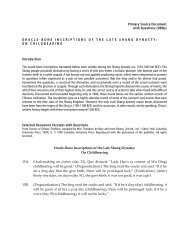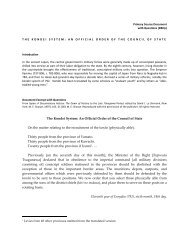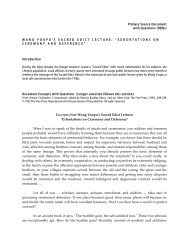The Buddha Preaches the One Great Vehicle - Asia for Educators ...
The Buddha Preaches the One Great Vehicle - Asia for Educators ...
The Buddha Preaches the One Great Vehicle - Asia for Educators ...
Create successful ePaper yourself
Turn your PDF publications into a flip-book with our unique Google optimized e-Paper software.
Primary Source Document<br />
with Questions (DBQs)<br />
S E L E C T I O N F R O M T H E L O T U S S Ū TRA: “ T H E B U D D H A P R E A C H E S T H E<br />
ONE GREAT VEHICLE”<br />
Introduction<br />
<strong>The</strong> Lotus Sūtra is a Buddhist scripture composed well after <strong>the</strong> death of <strong>the</strong> historical <strong>Buddha</strong> (around 483 BCE)<br />
and written down in Sanskrit even later. <strong>The</strong> scripture was translated into Chinese at least five different times<br />
between 255 and 601 CE and proved to be a tremendously influential text <strong>for</strong> Chinese Buddhism. <strong>The</strong> Lotus Sūtra<br />
is a text of <strong>the</strong> Mahāyāna School of Buddhism. As such, its major message is that <strong>the</strong>re is only one way to reach<br />
enlightenment, and that is through <strong>the</strong> way of <strong>the</strong> bodhisattva as described in <strong>the</strong> Lotus Sūtra. <strong>The</strong> passage<br />
below, which describes <strong>the</strong> <strong>Buddha</strong> talking with one of his followers, Śāriputra, addresses <strong>the</strong> question of <strong>the</strong><br />
multitude, of why <strong>the</strong>re are so many schools of Buddhism. This is an issue that Mahāyāna scriptures had to<br />
address, since <strong>the</strong>y were written relatively late in <strong>the</strong> history of Buddhism and had to compete <strong>for</strong> authority with<br />
earlier texts.<br />
Document Excerpts with Questions (Longer selection follows this section)<br />
From Sources of Chinese Tradition, compiled by Wm. <strong>The</strong>odore de Bary and Irene Bloom, 2nd ed., vol. 1 (New York: Columbia<br />
University Press, 1999), 447-448. © 1999 Columbia University Press. Reproduced with <strong>the</strong> permission of <strong>the</strong> publisher. All<br />
rights reserved.<br />
Selection from <strong>the</strong> Lotus Sūtra: <br />
“<strong>The</strong> <strong>Buddha</strong> <strong>Preaches</strong> <strong>the</strong> <strong>One</strong> <strong>Great</strong> <strong>Vehicle</strong>” <br />
<br />
“Śāriputra, ever since I attained <strong>Buddha</strong>hood I have through various causes and various similes <br />
widely expounded my teachings and have used countless expedient means to guide living <br />
beings and cause <strong>the</strong>m to renounce <strong>the</strong>ir attachments. Why is this Because <strong>the</strong> Thus‐Come <strong>One</strong> <br />
is fully possessed of both expedient means and <strong>the</strong> perfection of wisdom. …” <br />
<br />
… <br />
<br />
“Śāriputra, <strong>the</strong> <strong>Buddha</strong>s preach <strong>the</strong> Law in accordance with what is appropriate, but <strong>the</strong> <br />
meaning is difficult to understand. Why is this Because we employ countless expedient means, <br />
discussing causes and conditions and using words of simile and parable to expound <strong>the</strong> <br />
teachings. This Law is not something that can be understood through pondering or analysis. <br />
Only those who are <strong>Buddha</strong>s can understand it. …” <br />
<br />
… <br />
<br />
“Śāriputra, I know that living beings have various desires, attachments that are deeply <br />
implanted in <strong>the</strong>ir minds. Taking cognizance of this basic nature of <strong>the</strong>irs, I will <strong>the</strong>re<strong>for</strong>e use
Primary Source Document, with Questions (DBQ) on<br />
SELECTION FROM THE LOTUS SŪTRA: “THE BUDDHA PREACHES THE ONE GREAT VEHICLE”<br />
various causes and conditions, words of simile and parable, and <strong>the</strong> power of expedient means <br />
and expound <strong>the</strong> Law <strong>for</strong> <strong>the</strong>m. Śāriputra, I do this so that all of <strong>the</strong>m may attain <strong>the</strong> one <br />
<strong>Buddha</strong> vehicle and wisdom embracing all species. …” <br />
<br />
… <br />
<br />
“… <strong>The</strong>re is no o<strong>the</strong>r vehicle, <strong>the</strong>re is only <strong>the</strong> one <strong>Buddha</strong> vehicle.” <br />
Questions:<br />
1. In <strong>the</strong>se excerpts, how does <strong>the</strong> <strong>Buddha</strong> explain <strong>the</strong> existence of various<br />
Buddhist teachings<br />
2. As <strong>the</strong> Lotus Sūtra describes it, is <strong>the</strong>re one or are <strong>the</strong>re many truths<br />
3. Is <strong>the</strong> understanding of truth articulated in <strong>the</strong>se excerpts something that<br />
would contribute to a democratic and egalitarian religion or to an elitist<br />
religious hierarchy<br />
4. How do later texts in o<strong>the</strong>r philosophical or religious traditions deal with<br />
alternative texts that claim authority Do <strong>the</strong>y use techniques similar to<br />
<strong>the</strong> doctrine of “expedient means” Or do different philosophical or<br />
religious traditions use o<strong>the</strong>r strategies to establish <strong>the</strong> ultimate authority<br />
of a particular text or teaching<br />
Longer Selection<br />
From Sources of Chinese Tradition, compiled by Wm. <strong>The</strong>odore de Bary and Irene Bloom, 2nd ed., vol. 1 (New York: Columbia<br />
University Press, 1999), 447-448. © 1999 Columbia University Press. Reproduced with <strong>the</strong> permission of <strong>the</strong> publisher. All<br />
rights reserved.<br />
Selection from <strong>the</strong> Lotus Sūtra: <br />
“<strong>The</strong> <strong>Buddha</strong> <strong>Preaches</strong> <strong>the</strong> <strong>One</strong> <strong>Great</strong> <strong>Vehicle</strong>” <br />
<br />
At that time Mañjuśrī said to <strong>the</strong> bodhisattva and mahāsattva Maitreya and <strong>the</strong> o<strong>the</strong>r great men, <br />
“Good men, I suppose that <strong>the</strong> <strong>Buddha</strong>, <strong>the</strong> World‐Honored <strong>One</strong>, wishes now to expound <strong>the</strong> <br />
great Law.” … <br />
<br />
At that time <strong>the</strong> World‐Honored <strong>One</strong> calmly arose from his samādhi and addressed Śāriputra, <br />
saying, “<strong>The</strong> wisdom of <strong>the</strong> <strong>Buddha</strong>s is infinitely profound and immeasurable. <strong>The</strong> door to this <br />
wisdom is difficult to understand and difficult to enter. … <br />
<br />
“Śāriputra, ever since I attained <strong>Buddha</strong>hood I have through various causes and various similes <br />
widely expounded my teachings and have used countless expedient means to guide living <br />
beings and cause <strong>the</strong>m to renounce <strong>the</strong>ir attachments. Why is this Because <strong>the</strong> Thus‐Come <strong>One</strong> <br />
is fully possessed of both expedient means and <strong>the</strong> perfection of wisdom. … <br />
<br />
<strong>Asia</strong> <strong>for</strong> <strong>Educators</strong> | Columbia University | http://afe.easia.columbia.edu Page 2 of 3
Primary Source Document, with Questions (DBQ) on<br />
SELECTION FROM THE LOTUS SŪTRA: “THE BUDDHA PREACHES THE ONE GREAT VEHICLE”<br />
“Śāriputra, to sum it up: <strong>the</strong> <strong>Buddha</strong> has fully realized <strong>the</strong> Law that is limitless, boundless, <br />
never attained be<strong>for</strong>e. … <br />
<br />
“Śāriputra, <strong>the</strong> <strong>Buddha</strong>s preach <strong>the</strong> Law in accordance with what is appropriate, but <strong>the</strong> <br />
meaning is difficult to understand. Why is this Because we employ countless expedient means, <br />
discussing causes and conditions and using words of simile and parable to expound <strong>the</strong> <br />
teachings. This Law is not something that can be understood through pondering or analysis. <br />
Only those who are <strong>Buddha</strong>s can understand it. … <br />
<br />
“Śāriputra, I know that living beings have various desires, attachments that are deeply <br />
implanted in <strong>the</strong>ir minds. Taking cognizance of this basic nature of <strong>the</strong>irs, I will <strong>the</strong>re<strong>for</strong>e use <br />
various causes and conditions, words of simile and parable, and <strong>the</strong> power of expedient means <br />
and expound <strong>the</strong> Law <strong>for</strong> <strong>the</strong>m. Śāriputra, I do this so that all of <strong>the</strong>m may attain <strong>the</strong> one <br />
<strong>Buddha</strong> vehicle and wisdom embracing all species. … <br />
<br />
“Śāriputra, if any of my disciples should claim to be an arhat or a pratyeka‐buddha and yet does <br />
not heed or understand that <strong>the</strong> <strong>Buddha</strong>s, <strong>the</strong> Thus‐Come <strong>One</strong>s, simply teach and convert <strong>the</strong> <br />
bodhisattvas, <strong>the</strong>n he is no disciple of mine; he is no arhat or pratyeka‐buddha. <br />
<br />
“Again, Śāriputra, if <strong>the</strong>re should be monks or nuns who claim that <strong>the</strong>y have already attained <br />
<strong>the</strong> status of arhat, that this is <strong>the</strong>ir last incarnation, that <strong>the</strong>y have reached <strong>the</strong> final nirvāṇa, and <br />
that <strong>the</strong>re<strong>for</strong>e <strong>the</strong>y have no fur<strong>the</strong>r intention of seeking supreme perfect enlightenment, <strong>the</strong>n <br />
you should understand that such as <strong>the</strong>se are all persons of overbearing arrogance. Why do I <br />
say this Because if <strong>the</strong>re are monks who have truly attained <strong>the</strong> status of arhat, <strong>the</strong>n it would be <br />
unthinkable that <strong>the</strong>y should fail to believe this Law. … <strong>The</strong>re is no o<strong>the</strong>r vehicle, <strong>the</strong>re is only <br />
<strong>the</strong> one <strong>Buddha</strong> vehicle.” … <br />
<br />
<br />
<br />
<strong>Asia</strong> <strong>for</strong> <strong>Educators</strong> | Columbia University | http://afe.easia.columbia.edu Page 3 of 3



